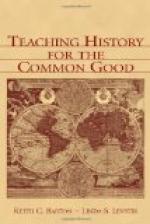Instruction in the use of the library and indexes
Having discussed with the class the questions assigned on the day of enrollment and explained the method of study recommended for their use, it will be well for the teacher to devote some time to instruction in the use of the library. It is possible that the older classes will require very little of this, but there are few classes where an hour, at least, cannot well be spent in a discussion of indexes, titles, and relative value of the works on various subjects. This hour need not be the regular recitation period. A session before or after school could be devoted to the purpose. The teacher’s instruction, however, will be greatly assisted if the students are asked to prepare answers before coming to class to such questions as the following:—
1. How much previous work have you done in the library?
2. Of what use
do you think the library should be to you in the
course
you are just entering?
3. What is a source book? Of what use are source books?
4. What source books on this period of history are in the library?
5. What do you
think will be the best references for questions on
the
artistic, industrial, political, social, economic,
and
military
phases of the history you are about to study?
6. What encyclopedias
and works of general reference are in your
library?
The preparation of answers to such questions as these will present to the student some of the difficulties inevitable to his future library work and will send him to class prepared to ask intelligent questions. It will enable the teacher accurately to gauge how much his students already know about a library and its uses.
The value and advantage of library work should be carefully explained to the class. It is a great error to allow pupils to think of their library work as drudgery, assigned solely to keep them busy or to make the course difficult. There are too few boys to-day with a genuine love of books, partly no doubt due to the fact that a reference library has become for them, not a rich mine of interesting matter, but a hydra-headed interrogation point. A great good has been done the student who has been taught the pleasure of using books. Nor is such a thing impossible. Nothing gives greater satisfaction to the normal high school boy than to find an error in the text, the teacher’s statements, or the map. He takes pleasure in confuting the statistics or judgments quoted in class, by others of opposite trend, encountered in his reading. He enjoys asking keen questions. If the student is told that the library work is for the purpose of cultivating his powers of investigation and adding to the matter in the text many interesting details; if the library requirements are reasonable and wisely directed; if he is given an opportunity to use the information he has gathered from his reading, his interest in books will steadily increase.




